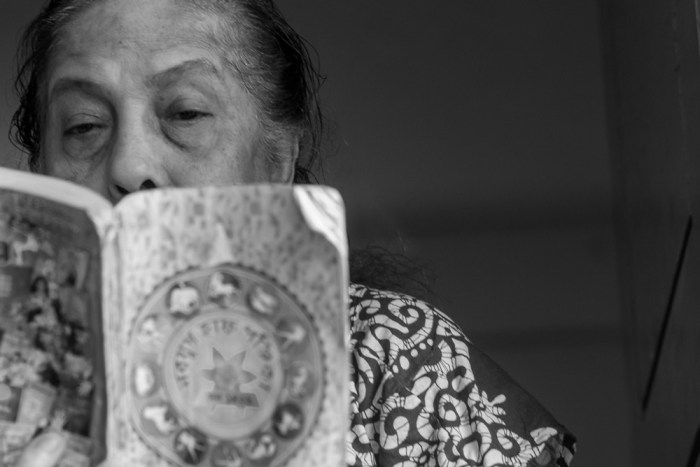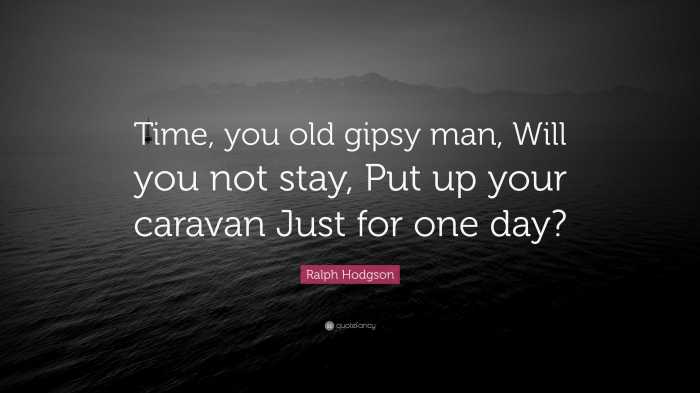Time you old gipsy man poem summary – In “Time You Old Gipsy Man,” the poet personifies Time as an enigmatic figure, delving into the profound effects of its relentless passage on the human experience. This poem, with its evocative imagery and thought-provoking themes, invites us on a journey through the labyrinth of time, its impact on our lives, and the emotions it evokes.
The poem’s structure, consisting of seven stanzas, provides a framework for the exploration of time’s multifaceted nature. Through the use of literary devices such as metaphors and personification, the poet paints a vivid picture of Time’s relentless march, its power to both heal and wound, and the bittersweet emotions that accompany its passage.
Poem Overview

The poem “Time, You Old Gipsy Man” by Robert Frost explores the theme of time’s relentless passage and its profound impact on human life.
The poem is structured in six stanzas of varying lengths, with a total of 32 lines. The free verse form allows Frost to convey the poem’s message in a conversational and evocative manner.
Imagery and Symbolism
Frost uses vivid imagery to depict the passage of time as a relentless force. The “old gipsy man” symbolizes time itself, with his “steady, quiet horse” representing the inexorable march of time.
The imagery of the “road” and the “fields” evokes the journey of life, while the “house with the narrow window” suggests the limitations of human existence.
Personification of Time
The poet personifies time as an old gipsy man, a figure who is both familiar and mysterious. This personification allows Frost to convey the elusive and enigmatic nature of time.
The old gipsy man’s “wrinkled face” and “tired eyes” symbolize the aging process and the accumulation of experience.
Time’s Passage and Effects
The poem portrays the passage of time as a bittersweet experience. While it brings wisdom and maturity, it also brings loss and regret.
The speaker reflects on the changes that have occurred over time, both in himself and in the world around him. He experiences a sense of nostalgia for the past and a bittersweet acceptance of the present.
Themes and Motifs
The main themes explored in the poem include the passage of time, the nature of human existence, and the search for meaning in life.
The poem also explores the motifs of aging, memory, and the contrast between the past and the present.
Literary Devices, Time you old gipsy man poem summary
Frost employs a range of literary devices to enhance the poem’s language and imagery.
- Metaphors:“Time is a thief,” “life is a journey.”
- Similes:“Time is like an old gipsy man,” “life is like a road.”
- Alliteration:“wrinkled face,” “steady, quiet horse.”
Historical and Cultural Context
The poem was written in 1936, during a period of significant social and economic change. The Great Depression had left a lasting impact on American society, and the poem reflects the sense of uncertainty and nostalgia that characterized the era.
Frost’s own experiences as a farmer and a witness to the changing landscape of rural America influenced the poem’s themes and perspectives.
Q&A: Time You Old Gipsy Man Poem Summary
What is the central theme of “Time You Old Gipsy Man”?
The central theme of the poem is the passage of time and its profound impact on the human experience, exploring the emotions and experiences associated with aging, mortality, and the fleeting nature of life.
How does the poet personify Time?
The poet personifies Time as an old gipsy man, a mysterious and enigmatic figure who represents the relentless and unpredictable nature of time’s passage.
What literary devices are used in the poem?
The poem employs a range of literary devices, including metaphors, similes, personification, and alliteration, which enhance the poem’s imagery, language, and emotional impact.

